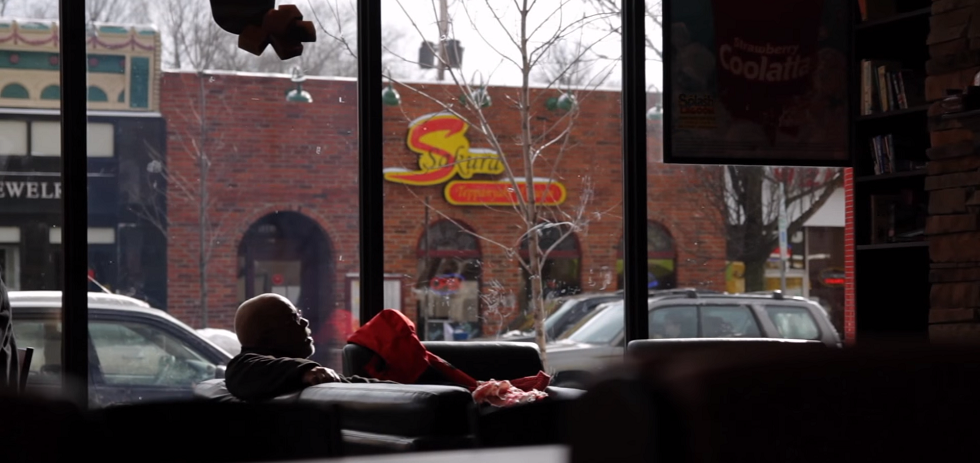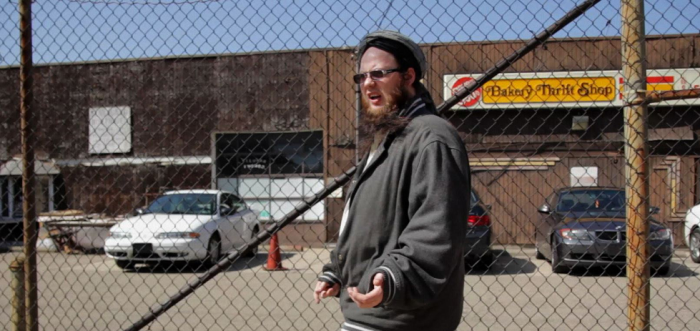
There have been volumes written about post-9/11 cinema, which ranges from explicitly biographical dramas (Zero Dark Thirty) to action films that crib its associated scenes of destruction for entertainment (Batman V Superman most recently). Whilst documentary cinema on this subject has sought after American accountability for their actions in foreign nations (Taxi to the Dark Side) and within federal agencies (CITIZENFOUR), none of them have taken such a ground-level approach as to track a counter-terrorist sting operation as it progresses on American soil. This is exactly what young directors Lyric R. Cabral and David Sutcliffe have done with the riveting (T)ERROR, which not only studies a paid American informant as he gathers intel to warrant a citizen’s arrest in Pittsburgh—a process that occurs in 50% of arrests on terrorism suspicion—but also the supposed terrorist-in-training locked in the crosshairs, a white Muslim named Khalifah al-Akili. What emerges from examining the two parties is an engaging real-world character piece which highlights the viciously ironic war being waged within America’s borders, in response to perceived threats from outside them.
The informant, Saeed “Sharriff” Torres, is our first point of entry to the narrative, his hometown kept secret and his son’s face blurred out. He cooks food at local basketball games and joyfully dances on the sidelines, but the story of his past is a lesson in regret. Pinned by police for a ticket booth theft during his time as an Islamic civil rights activist, he was strong-armed into paid informant work that saw him imprison one of his own friends. It’s savage that such a crime should rob him forever of his status as an independent citizen—though he still refers to himself as a “civilian operative”; someone with a foot in both worlds—and Cabral and Sutcliffe appear to channel that sentiment in their use of nostalgic archival footage of circa-70s Bedford-Stuyvesant and Brooklyn. The flipside is that the news footage in the film’s second half, which covers the FBI’s exploits, feels intentionally like a soothing missive for Islamophobes, so the gulf between public knowledge and internal struggle yawns that much wider.
Right in the midst of Saeed’s operation, as he doggedly chases leads and pacifies his superiors, Cabral and Sutcliffe go and speak to Khalifah, without informing either man that they’ve met the other. This would suggest an extreme and duplicitous reach for objectivity, but if we look to deduce their intentions, there is a telling warmth in the way they frame establishing shots of Khalifah’s home. The tight angles that make Saeed seem rare and elusive during his mission become a window into this other man’s relatable trappings: his bare feet rubbing the carpet, a book on parenting, and a stack of PlayStation 3 games. By contrast, we have only Saeed’s self-camouflaging interactions with others—cheering at the sports match, cooking for his son—to go on, and we don’t even see him when he first speaks, since the audio recording of his lines are fed to us against a black frame. Cabral has known the man for years, and while that familiarity hasn’t bred contempt per se, the guile with which he serves his government isn’t cherished, and the contempt that the news media later cultivate for Khalifah is not at all embraced.

The narrative moves with the push and pull between these two parties, and fittingly, there is a welcome sense of manipulation and double-play introduced early on. Questions from Cabral and Sutcliffe largely sound like they’ve been inserted in ADR, and at points their footage is spatially confined and erratic, as though viewing Saeed through the glass of a rocking porthole. The whole ship would sink into artificiality if not for Saeed himself, who speaks testily and bluntly even with the directors’ artifice in place; something that Cabral’s acquaintance undoubtedly kindles. Knowing that the FBI expressed keen interest in the production, which then led to production insurance brokers being either cagey or ludicrously expensive, makes sadly perfect sense1—there are few things more genuine than the scapegoating and contrivance of justice that takes place here, and to know that it occurs within the often self-touted “free world” is terrifying by itself.
More apparent in the film, however, is the vilification of Islam in America, which could not be more relevant today considering the presumptive Republican presidential candidate’s naked prejudice.2 More than just being timely, this theme plays out through deeply personal, unmanufactured drama. Saeed has been all but banned from his former mosque, having jailed former friend Tarik Shah and gotten a fatwa for it, and clearly carries the weight of guilt for this even today. Shah’s mother pities him and seems to be managing her own pain quite well, making it more pronounced through devastating contrast. Likewise, the sympathy for Khalifah is carried through all the way to the resolution of the case, which is infuriating and, in another sense, no resolution at all.
The film’s detractors have begged for more trenchant analysis of the issues involved, but Cabral and Sutcliffe don’t pull punches so much as aim them at unexpectedly personal pressure points. As twin DPs on the film, they make it clear with their cameras where their focus is: how the Federal stampede to look secure locks its servants into lifelong prisons of regret, be that behind bars or a Pittsburgh rental home. All of this might appear from a detached, cable news-filtered perspective as the rough means to a justified end, but it’s a smokescreen to highlight the ludicrous offsetting of responsibility by an organisation driven more to cover their asses than maintain national security. The title alone of (T)ERROR makes this thin shroud clear, and the “error” it conceals is brought to devastating life by two fine film-makers of enviable courage.
Around the Staff
| Megan Nash | |
